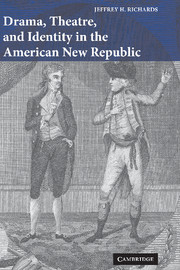Book contents
PART II - Coloring identities: race, religion, and the exotic
Published online by Cambridge University Press: 22 September 2009
Summary
If plays about the Revolution appear to concern themselves primarily with issues of nationality, drama in the new republic also presents race, ethnicity, and religion in terms familiar to an Anglo-American stage even as they complicate the question of American identities. While many of the Revolution plays tend to suppress this aspect in order to emphasize the more conventional, if conflicted, battles between British and loyalist, American and patriot, others, as in Crèvecoeur with his portrayal of Presbyterians and African slaves or Murray with her inclusion of ethnic characters, create more heterogeneous worlds. In Chapter 7, Susanna Rowson's Slaves in Algiers serves as but one play in a long tradition of British and American drama that portrays Islamic characters before the largely Christian audiences of early modern and eighteenth-century Britain and America. One point made here is that all American portrayals of ethnic characters, whether they reflect the demographics of the United States or not, grow out of earlier and contemporary representations of religion and ethnicity in British theatre. This is not to deny contributions by American writers to the traditions of such representation, but to acknowledge the difficulty for American authors of escaping the long shadow cast by London on New York or Savannah. Even, as in Chapter 8, when one takes up the matter of portraying Native Americans, playwrights such as James Nelson Baker often turn to a vocabulary established by the British stage, even in analogies between one race and another.
- Type
- Chapter
- Information
- Drama, Theatre, and Identity in the American New Republic , pp. 141 - 142Publisher: Cambridge University PressPrint publication year: 2005



